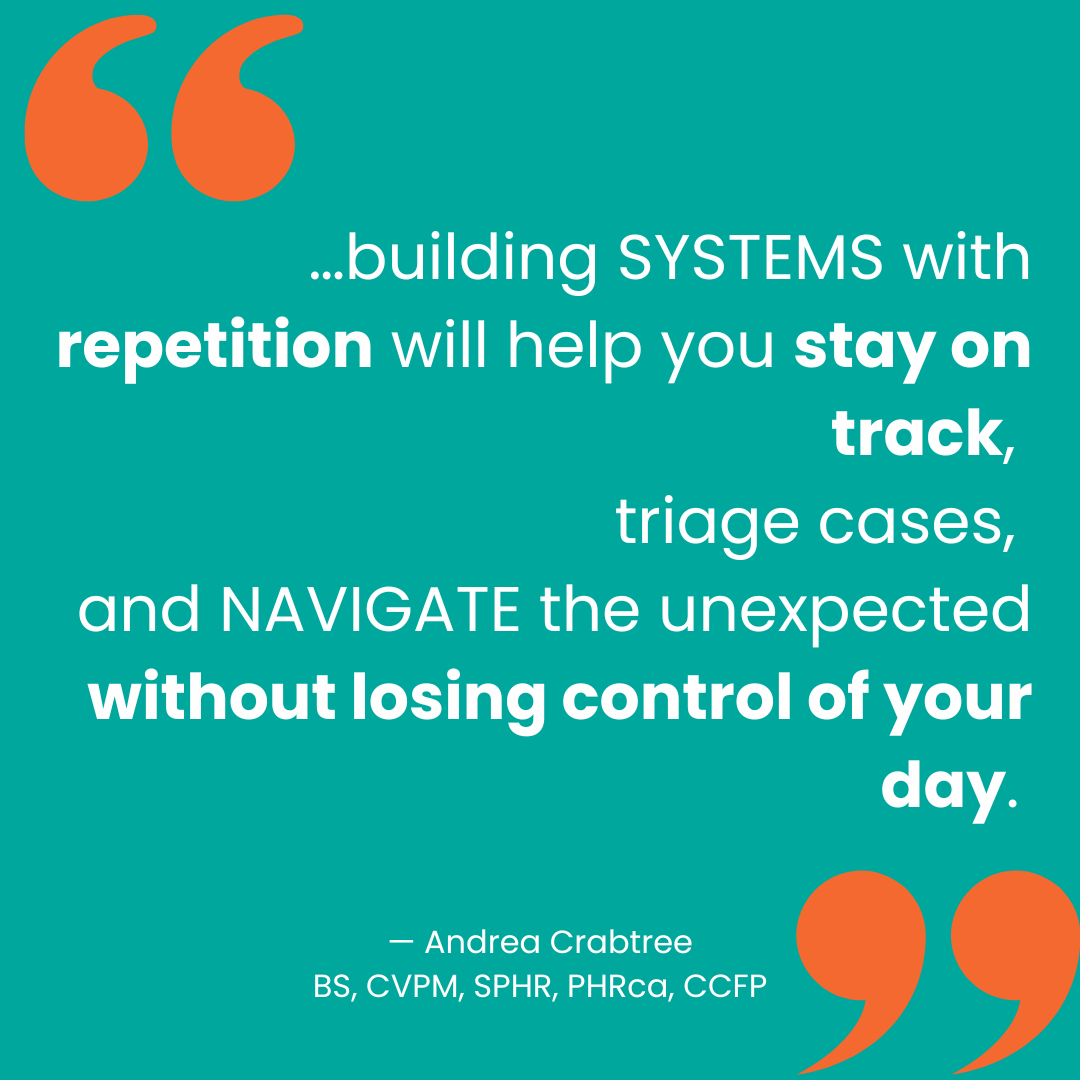Mastering time management as a new veterinarian is about more than productivity, it also plays a protective role in your physical and emotional health and your overall job satisfaction. This month, Ready, Vet, Go is collaborating with my friend and colleague, Andrea Crabtree BS, CVPM, SPHR, PHRca, CCFP, veterinary practice manager and owner of FurPaws Consulting, for expert tips and insights on time management for new veterinarians. In addition to serving as a guest speaker for the current cohort, she’s generously agreed to share her thoughts on time management with our blog audience.
Dani Rabwin: Andrea, on behalf of Ready, Vet, Go I’m so excited to collaborate with you this month! I know you’ll have some incredible insights for our mentees. Let’s start by identifying the problem areas. Where do you see new or early-career veterinarians struggling to manage their time?
Andrea Crabtree: New veterinarians often struggle to see cases on a time limit. I see them using their time to look things up on VIN or research case studies and drug doses. They’re searching for confirmation because they’re not confident in themselves. They also take a long time with their medical records, writing lengthy and detailed SOAPs. Many new grads fail to effectively utilize their technicians, CSRs, and the rest of the team because they want to perform the task themselves. This might be because they don’t know the team members’ abilities or they don’t trust them. These rabbit holes can put new veterinarians behind in exam rooms and with appointments, resulting in bad habits, frustrated leadership, and frustration with themselves.
DR: How can new veterinarians better utilize their time in and outside the exam room?
AC: Addressing these areas can be endless and overwhelming, especially because new grads are adjusting to so many other things. But, how do you eat an elephant? One bit at a time! I recommend concentrating on maybe two or three things at a time—each shift, each week, or each month—and working on progress, not perfection.
Some simple ways that new grads can increase their efficiency are to create a digital or paper “dose card” with common drugs and doses, use technology such as AI-powered scribes and templates to speed up charting, and most of all, learn their team’s skill sets and then utilize members to their maximum capacity to assist with client and patient care.
DR: We all know vet med can be unpredictable. How can new veterinarians stay organized when unexpected emergencies or urgent cases arise?
AC: There will always be that unexpected appointment, the stable patient that is not so stable after all, an anesthetic crisis, or the routine procedure that goes awry. That’s why it’s vital to use a system for tracking cases, needed follow-up, and client communication. This might be your practice management software or some other technology to aid in tracking. Regardless of the method, building systems with repetition will help you stay on track, triage cases, and navigate the unexpected without losing control of your day. The key to staying organized is keeping cool. Getting flustered will only disrupt the organization. Conquering this is key!

DR: Some new grads may feel uncomfortable asking their employer for additional time or special allowances (e.g., protected time for charting, fewer appointments) to initially improve their time management. What are some tips for addressing these struggles with a practice owner or manager?
AC: Asking for support from practice leadership should be an open, two-way conversation. New grads should stay open to feedback and suggestions from their managers, practice owners, mentors, and colleagues. Someone else’s ideas for efficiency might work better than expected. For example, simply asking for more time or fewer appointments might not be the financially prudent solution—and, may not actually improve your time management. Digging deeper into the problem and trying different solutions can be uncomfortable but ultimately it’s worth the stretch. Have transparent conversations, be open to other ideas, and be committed to trying several options.
DR: How can mentors and practice leaders support new grads as they work to improve their efficiency and find their personal style of practice?
AC: As a practice manager, regular (i.e., weekly, monthly, quarterly) meetings to discuss obstacles, propose solutions, celebrate successes, and build relationships are vital to any new grad’s success. Frequent feedback is also critical—what is going right, what is not, and what can they add to the practice culture, patient care, client care, and overall employee team health? People want a sense of belonging. They want to feel like they’re contributing and a part of something bigger than themselves. Practice leadership can support all new team members— specifically new veterinarians—by identifying, exploring, and addressing these areas.
Like performing a physical exam or communicating with clients, time management is a skill that requires intention, effort, and a little professional guidance. But, investing the time now to establish good habits will set you up for a lifetime of greater satisfaction and success.
The industry expertise and practical insights provided by Andrea in this interview are a sample of what our Ready, Vet, Go mentees receive with each cohort. Through a host of incredible guest speakers and live educational opportunities, mentees enjoy a rich and deep learning experience that goes beyond clinical skills to build confidence, connection, and community.
Ready for more? Connect with Andrea on LinkedIn or through her business page, FurPaws Consulting where you can find helpful articles, videos, and a link to her podcast, Pawsitive Leadership!
Ready, Vet, Go Veterinary Mentorship is an innovative online program and community that helps new and early career veterinarians build confidence, gain independence, and experience greater joy. Visit our FAQ page to learn more about what we offer or get in touch with our team.

